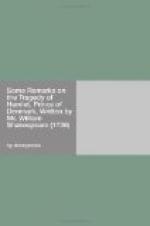of the whole Conduct of the Play, the Reader must
not be surprised, if I censure any Part of it, although
it be entirely in Conformity to the Plan the Author
has chosen; because it is easy to conceive, that a
Poet’s Judgment is particularly shewn in chusing
the proper Circumstances, and rejecting the improper
Ones of the Ground-work which he raises his Play upon.
In general we are to take Notice, that as History
ran very low in his Days, most of his Plays are founded
upon some old wretched Chronicler, or some empty
Italian
Novelist; but the more base and mean were his Materials,
so much more ought we to admire His Skill, Who has
been able to work up his Pieces to such Sublimity
from such low Originals. Had he had the Advantages
of many of his Successors, ought not we to believe,
that he would have made the greatest Use of them?
I shall not insist upon the Merit of those who first
break through the thick Mist of
Barbarism in
Poetry, which was so strong about the Time our Poet
writ, because this must be easily sensible to every
Reader who has the least Tincture of Letters; but
thus much we must observe, that before his Time there
were very few (if any) Dramatick Performances of any
Tragick Writer, which deserve to be remembred; so
much were all the noble Originals of Antiquity buried
in Oblivion. One would think that the Works of
Sophocles,
Euripides, &c. were Discoveries
of the last Age only; and not that they had existed
for so many Centuries. There is something very
astonishing in the general Ignorance and Dullness of
Taste, which for so long a Time over-spread the World,
after it had been so gloriously enlighten’d
by
Athens and
Rome; especially as so
many of their excellent Master-pieces were still remaining,
which one would have thought should have excited even
the Brutes of those barbarous Ages to have examined
them, and form’d themselves according to such
Models.
VOL. the 7th of Mr. Theobald’s Shakespeare.
Page 225.
SCENE I
Bernardo and Francisco, two Centinels.
Bernardo. Who’s there? &c.
Nothing can be more conformable to Reason, than that
the Beginning of all Dramatick Performances (and indeed
of every other kind of Poesie) should be with the
greatest Simplicity, that so our Passions maybe work’d
upon by Degrees. This Rule is very happily observ’d
in this Play; and it has this Advantage over many
others, that it has Majesty and Simplicity joined
together. For this whole preparatory Discourse
to the Ghost’s coming in, at the same Time that
it is necessary towards laying open the Scheme of
the Play, creates an Awe and Attention in the Spectators,
such as very well fits them to receive the Appearance
of a Messenger from the other World, with all the
Terror and Seriousness necessary on the Occasion.
And surely the Poet has manag’d the Whole in
such a Manner, that it is all entirely Natural:
And tho’ most Men are well enough arm’d
against all Belief of the Appearances of Ghosts, yet
they are forced, during the Representation of this
Piece, entirely to suspend their most fixed Opinions,
and believe that they do actually see a Phantom, and
that the whole Plot of the Play is justly and naturally
founded upon the Appearance of this Spectre.




